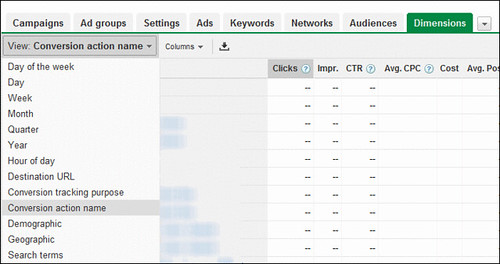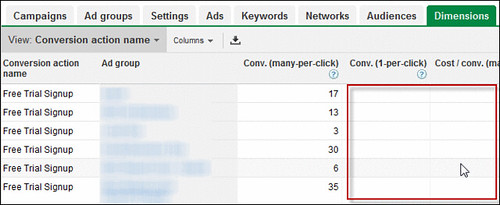If you're a PPC software company, one of the best opportunities to add value on top of the AdWords interface is by thinking more about advertiser pain points than Google is able to. Google frequently has to balance features that help their advertisers generate more revenue against features that help Google generate more revenue, and frequently since Google isn't an advertiser, even when they build something that seemingly has optimizing for conversions in mind, they don't always get it quite right for the advertiser.
Just as it's important to realize which new AdWords features aren't necessarily worth implementing, it's equally important to identify gaps in AdWords' feature set and reporting so you can find ways to fill it. Today we'll talk about one of these gaps: reporting on multiple 1-per-click conversion types in AdWords.
Why Would You Need to Report on Multiple Conversion Types in 1-Per-Click Reporting?
Let's say I have a software product. I offer a free trial of that product. I also have some white papers that people can fill out a form and download, and there is a free account people can sign up for on my site to be a part of my community and use some free tools we offer. I set up an AdWords account and target informational keywords with my white paper offer, I send more transactional queries to my free trial offer, and some people from both groups bounce around my site and find their way to a free account sign-up.
Now my challenge is that I want to understand how much value my paid search campaign is actually driving. The trouble is all conversions aren't created equal. White papers don't lead to sales at the same rate as free trials. So what about when I want to drill down and find out how many free trials a campaign has driven and not have any white paper or free account data coloring the decision? And I want to know about the number of unique free trials generated so I can get an idea of what I'm paying for every trial.
If I want to get this information in a report from the AdWords interface, the reality is: I can't.
There's No More 1-Per-Click Reporting by Conversion Type
When Google sunset their reporting tab, they moved many of the reports you were able to pull there into the dimensions tab. If you go into the dimensions tab you can actually grab a report that breaks down conversions by the conversion name (or conversion type, i.e. free trial, white paper, etc.):
This is great, and we can actually drill down now and get some information about specific types of actions at the ad group level, but there's quite a bit missing:
So what happend to the 1-per-click and cost data in this report? According to an AdWords rep:
I asked the technical team and you just need to select the "many per click" from the columns option, you'll see the conversions. This is intentional, as many-per-click data is actually the only way to properly categorize the conversions that occurred. Here's a bit more context on how the Report Center used to calculate the 1-per-click metric when segmented by conversion type:
Let's say we have conversion type 1 (submit a sign-up form) and conversion type 2 (make a purchase). A user clicks on your ad and completes both actions, in that order. When segmenting 1-per-click conversion metrics by type in the Report Center, you would only see statistics for the action that was completed first. In other words, type 2 would not be reported at all, even though there was a conversion that occurred.
Now, with many-per-click stats, you can segment by conversion type and see the correct number of completed actions for both a sign-up form and purchase.
So the 1-per-click being sunsetted was an attribution problem. And in the case of our free trial this is, in fact, probably cleaner data (we can see which people actually signed up for a trial, and most people aren't signing up for multiple trials).
You can also get at this data down to the keyword level by creating a custom keyword report in Google Analytics that includes goals and filters for CPC traffic.
How is this An Opportunity for PPC Software Vendors?
In the example above we might have solved the problem sufficiently for our purposes using many-per-click and custom reporting in Google Analytics -- particularly if we're spending small amounts per month, in less competitive verticals, etc. But what if we weren't?
Attribution is a sticky problem that a lot of smart companies are working to solve. If I'm doing a lot of volume via PPC and rather than having a free trial that people typically only sign up for once, I have a sale of an item that people make multiple times, the idea of identifying where the original conversion came from, how much weight I put on the first touch versus the second and so on.
AdWords itself is making inroads to better understand attribution with features like AdWords search funnels, but problems like these represent real opportunity for software vendors to solve specific problems, and it's important for the AdWords advertiser to understand the challenge here and the way that AdWords is reporting on it so that she can determine whether she needs a more robust solution or not.
About the Author
Tom Demers is co-founder and managing partner at Measured SEM search engine marketing consulting, a boutique search marketing agency offering search engine marketing services ranging from pay-per-click account management to search engine optimization and link building services.
You can learn more about how Measured SEM can help or get in touch with Tom directly via email at tom at measuredsem.com or by following him on Twitter.
This post originated on the WordStream Blog. WordStream provides keyword tools for pay-per click (PPC) and search engine optimization (SEO) aiding in everything from keyword discovery to keyword grouping and organization.
Source: http://www.wordstream.com/blog/ws/2011/04/04/reporting-on-multiple-conversion-types
search engine optimization internet marketing online marketing website optimization improve google rankings


No comments:
Post a Comment